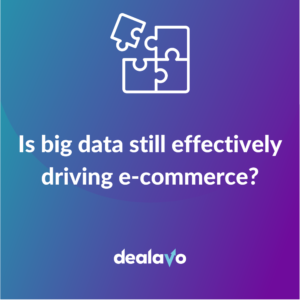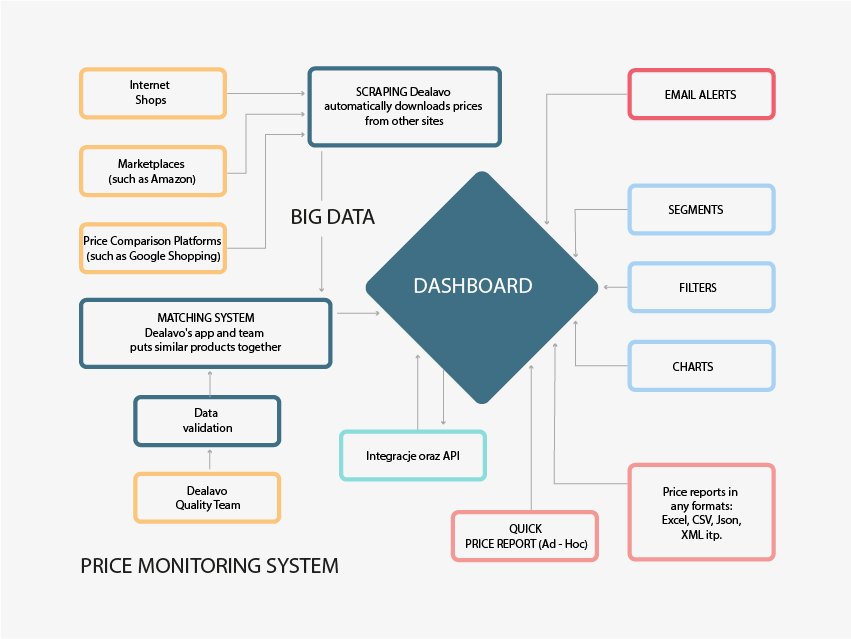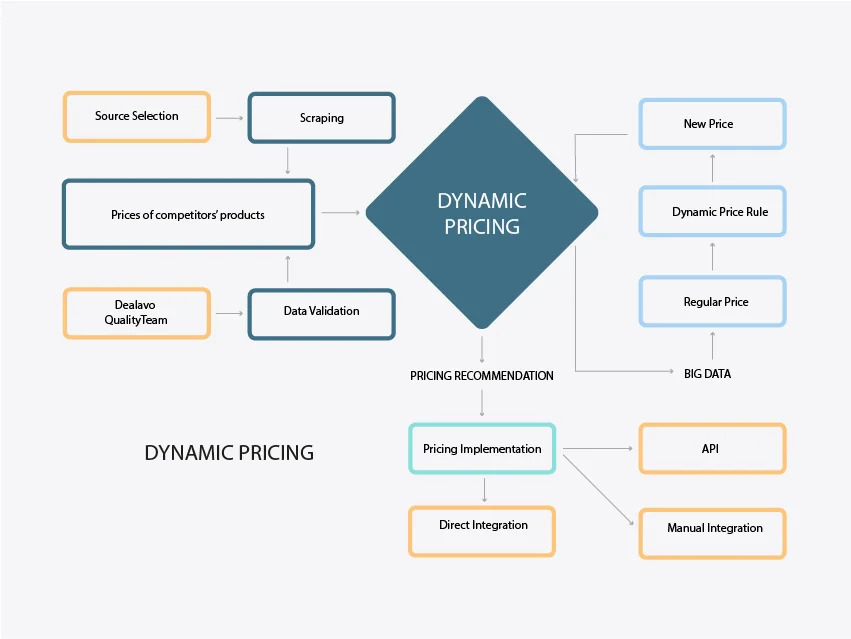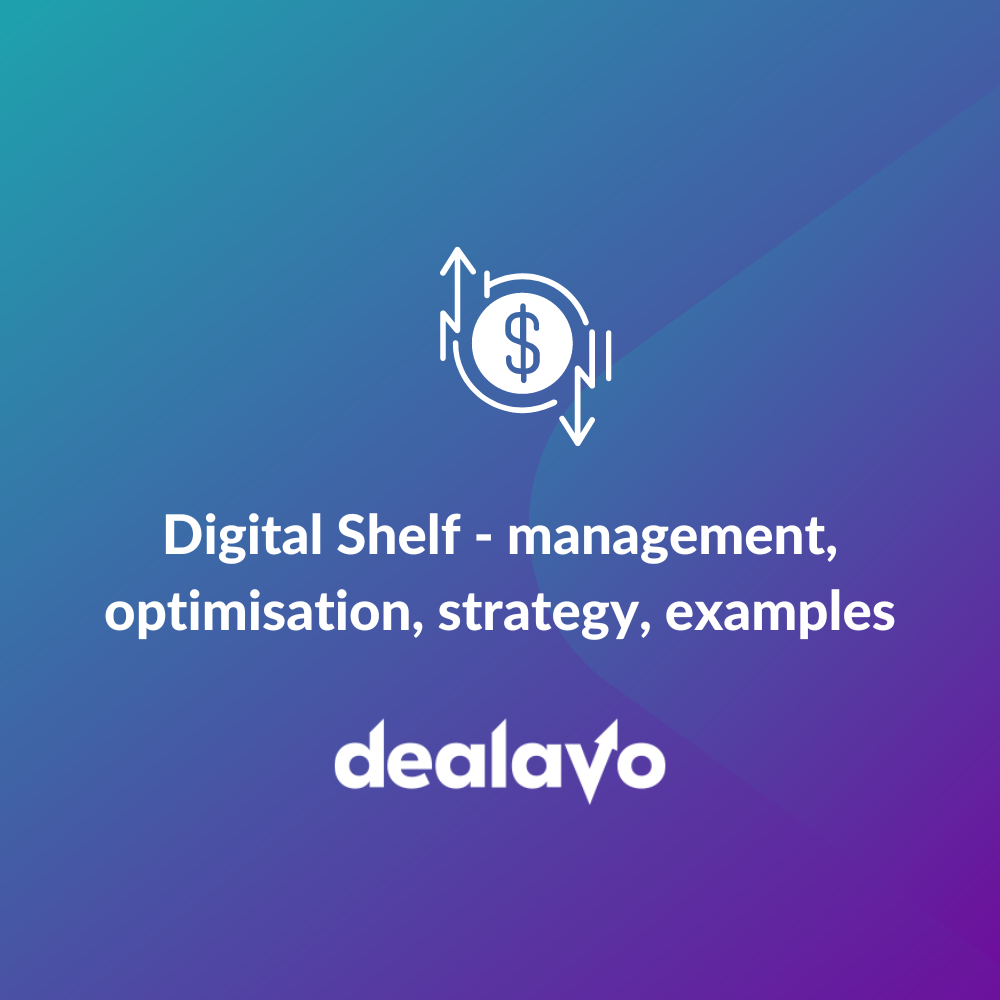
Is big data still effectively driving e-commerce?
The world of big data, known as Big Data, has become a fundamental pillar of modern e-commerce, sparking a revolution in the way companies approach creating effective business strategies. It is now hard to imagine an online business that does not utilise data and base most of its decisions on it. Furthermore, the principle of ‘data first’ remains strong and continues to underpin many businesses. Projections indicate that the global market for big data, currently estimated at $307.52 billion, could reach as much as $745.15 billion by 2030, further supporting this notion.
At the same time, it is worth noting that having access to vast amounts of data is no longer a luxury but a critical component of business strategies. So how does data impact the different areas of e-commerce?
Big Data about Big Data
Every minute sees 6.3 million Google searches worldwide. However, what is particularly interesting is that 90% of the world’s data is unstructured. This encompasses email or text messages, social media posts, blogs, or audio/video recordings.
More than 78% of very large organisations (10,000+ employees), 48% of large organisations (1,000+ employees), and 43% of medium-sized organisations (100+ employees) utilise Big Data, and this percentage continues to grow.
It is estimated that more than 97% of companies worldwide have invested in Big Data, yet only 40% have invested in Big Data analytics. In practice, this means that more than half of companies collect information that they do not process in any way, rendering it practically useless.
Huge amounts of data that need to be processed effectively
As technology advances, the amount of data collected by e-commerce companies continues to grow. According to an IDC report, the digital world of data is expected to expand by 61% to 175 zettabytes by 2025, with e-commerce contributing significantly to this growth. The data in question will include customer social media activity, geolocation services, browsing history, and abandoned online shopping baskets, and this is just the tip of the iceberg.
While collecting consumer data is important, it is data analytics that gives e-commerce companies a distinct advantage. Through Big Data analytics, companies can understand customers’ purchasing behaviour within the context of current market trends. This enables them to adapt their marketing strategies, adjust pricing, create new products, or effectively compete in the marketplace by optimising their portfolio.

Segmenting, analysing, and learning from data should be the mantra of any mature online business. But is this the case in practice?
Big Data for Product Development
Creating products that resonate with customers is a true art – an art mastered by a select few. Those who succeed in this arena are characterised by a deep understanding of customer needs. The key to this understanding lies in the collection and analysis of vast amounts of data. As we’ve reiterated many times before, data serves as a cornerstone for success in e-commerce.
By employing advanced data analytics technologies, e-commerce platforms can accurately track user behaviour on their websites. From clicks to adding products to the basket, to completing a purchase – every customer action can be meticulously analysed and interpreted.
“In the world of e-commerce, where competition is fierce and customer loyalty is hard to come by, data is becoming a crucial resource. Data is the new currency, surpassing the value of traditional wealth like oil or gold,” says Piotr Kacała, CTO/Board/Advisor at companies such as Displate and GOG.com.
Related articles:
Gaining a comprehensive understanding of customer behaviour enables companies to tailor their products and offers. This entails not only creating personalised offers but also anticipating future customer needs. This foresight enables companies to predict market trends and deliver products that exceed expectations even before customers can articulate them.
“However, leveraging Big Data in e-commerce is not solely about product customization. It’s also pivotal for gaining a competitive edge. Companies that can effectively analyse data and derive insights from it are poised to react swiftly to market changes and adapt their offerings to new trends,” adds Peter, who shares his experience with the Product Cards project, where he assists technology companies in building better products.
“In an era where artificial intelligence, intricately intertwined with Big Data, is increasingly permeating our daily lives, the value of data is skyrocketing, propelling us towards a new reality. Could it be that the adage ‘May we live in interesting times’ will forever stick with us?”
Big Data and Customer Service
In customer service, Big Data plays a pivotal role in swiftly identifying and addressing customer issues. It facilitates the collection of valuable feedback and enables tailored offers to meet individual user needs. This is crucial for maintaining high levels of customer satisfaction and fostering brand loyalty, among other benefits.
Daniel Formela, CTO and co-founder of Responso, shares his insights: “The use of advanced analytics tools enables the aggregation and analysis of vast volumes of data from various sources, empowering e-commerce businesses to promptly discern shopping trends, preferences, and customer concerns.”
Analysing data sourced from social media, online forums, feedback forms, or online chats allows businesses to gain a comprehensive understanding of user expectations and preferences. The key lies in harnessing and effectively utilising this data in customer service, regardless of the customer service objective.
- Read also: How Dealavo use their Customer Success Team
“Centralising data and ensuring real-time accessibility enables customer service to collaborate closely with other departments such as marketing, sales, or logistics. This integration of activities fosters consistency in customer interactions and facilitates swift responses to their needs and issues,” adds Daniel Formela of Responso.
Success in this realm hinges not merely on possessing data but on analysing it effectively within a rapid timeframe.
“Investing in advanced analytical tools and prioritising data are imperative for companies aiming not only to survive but also to thrive in the dynamically changing e-commerce landscape. Customers of modern CRM systems, such as Responso, can respond to customers and the market with much greater precision,” concludes Daniel Formela.
Big Data and Pricing Strategies
Data plays a critical role in shaping pricing strategies in e-commerce. It’s challenging to envisage a company excelling in the market without insights into this domain.
According to data from Big Data Statistics – Demond Sage, 27% of company directors confirmed that data-related activities within their companies have yielded profits. Moreover, 45% stated they could break even with the assistance of Big Data.
These statistics underscore the significance of data in business development and retention, including effective e-commerce pricing.
You can read also:
- 7 ways to use repricing with Dealavo in your pricing strategy that you need to know
- TOP 7 best pricing software for e-commerce
- Maximizing Seasonal Revenue: Effective Techniques for E-commerce Sellers
Beyond the provision of data, the quality and relevance of the data are paramount. In the realm of repricing solutions and market monitoring, there’s no margin for error or underestimation.
“At Dealavo, advanced algorithms, supported by human oversight, enable us to maintain an accuracy level of 99%. Additionally, our data update process is cyclical, ensuring our clients remain abreast of pertinent information,” asserts Jakub Kot, CEO at Dealavo.
“We also emphasise the importance of segmentation, projection, and analysis capabilities. Without the capacity to harness Big Data effectively, we’re left with dry facts that, without adequate understanding and awareness, fail to serve as tools for gaining a competitive edge,” adds Dealavo’s CEO.

“Today, we are capable of offering our customers tailored solutions for working with data. These solutions not only provide insights into prices but also have a real impact on the entire chain, generating higher margins and gaining a competitive advantage in a given market.”
With the vast amount of data being processed, personalization becomes a crucial element. Monitoring three comparison sites and three marketplaces may prove to be a better solution than checking a hundred competitor sites. This approach saves time and funds, but it’s not coincidental.
“The effectiveness of our tool and a good repricing policy lies in understanding the needs of the specific customer. We don’t need to monitor all available data, only the data pertinent to a particular business. This represents a real shift in mindset, saving our clients time and funds,” concludes Dealavo’s CEO.

“Benefiting from the supplier’s knowledge, years of experience, and access to their technological resources gives us greater confidence when making key business decisions. By implementing Dealavo’s tool, we gain assurance in data accuracy, and effective monitoring of competitors’ activities helps us build a market advantage and achieve higher margins on the products we offer.”
If you want to find out how Dealavo can help you acquire new clients, sign up for a free DEMO of the tool.
Big Data and Google Ads
Big Data is pivotal in the effectiveness of the Google Ads platform. In today’s evolving online advertising landscape, the analysis and use of big data are indispensable for success in online advertising campaigns. There are several reasons for this.
Firstly, it enables precise targeting of users. With big data, Google can track users’ online behaviour, including searches, clicks, or website navigation, allowing for precise definition of target groups for advertising campaigns. This significantly enhances ad effectiveness and leads to better ROI results.
Another crucial aspect is the ability to personalise ads. By analysing big data, Google can tailor ads to individual user preferences and needs. For example, if a user frequently browses travel-related pages, Google can display ads for holiday offers, increasing the likelihood of click-through and conversion.
Remarketing, or retargeting users who have previously interacted with a website, is also important. Thanks to data analysis, Google Ads can precisely identify users potentially interested in a product or service and display relevant ads, effectively utilising the advertising budget and increasing conversion rates.
Case Study with Adrenaline.pl
Campaign optimization is another key element for success in online advertising. Google Ads, with its vast amount of data, enables continuous monitoring of campaign performance and adjustments to improve effectiveness. Advertisers can analyse various metrics such as click-through rate (CTR), cost-per-click (CPC), or conversion rate and adapt their advertising strategy accordingly.
However, the data we collect also pertains to the initial interaction with service users on our website.
“The ‘Digital Markets Act’ is about to come into force – this new provision on digital markets enforces website owners to respect the rights of internet users,” warns Pawel Korenik.
“The legislation has real implications for how data is obtained and processed. Practically, it means that information provided by website owners must comply with privacy laws, obtained only with user consent. Breaching DMA rules can lead to financial penalties, potentially as high as 10% of a company’s annual turnover,” he concludes.
Related articles:
- 5 Google Ads Tools to Automate Your Campaigns
- Optimizing Google Shopping Ads – 10 Ways You Need to Know
SEO and Big Data
Shop positioning occurs at both the category and individual product levels. Several tools utilize Big Data to support online shop SEO, yet Excel remains a staple for data management. Primary among an SEO’s toolkit is Google Search Console, offering extensive data on keyword positions, page averages, and potential impressions.
“We can pinpoint keywords whose slight ranking improvement could significantly boost site traffic. Once we gather this data, we turn to tools like SEO Surfer, which recommend keyword saturation and related terms to match TOP10 search results, along with link-building strategies,” suggests Paweł Kijko, an independent SEO expert.
Additional tools, such as Ahrefs, analyze internet links, including those to your site and competitors’. “This insight guides link-building opportunities and helps mitigate potential threats,” adds Pawel Kijko.
Without tools analyzing vast datasets, SEO efforts would be inefficient and labor-intensive.
Check also:
Though the concept of Big Data has faced controversy, it’s now an essential tool in the marketing landscape. Its significance lies in optimizing search engine results, benefiting both customers and businesses.
For thousands of online businesses, Big Data offers a powerful solution. Through extensive datasets, businesses gain comprehensive insights into customer needs and preferences. Moreover, Big Data facilitates precise customization of products, marketing campaigns, and strategic objectives, enhancing competitiveness and driving business success.




